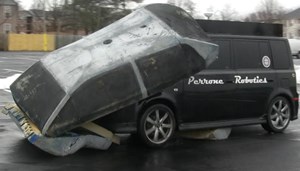Mar 24 2015
Mission Secure Inc. (MSi), a next generation cyber defense solutions provider focused on delivering advanced protections for physical systems to the defense, energy and transportation sectors, and Perrone Robotics Inc. (PRI), a leading-edge provider of robotic and autonomous ground vehicle solutions for commercial and military applications, today announced the completion of a track test pilot project that successfully demonstrated MSi's Secure Sentinel platform's capability to monitor, detect, inform and correct cyber attack scenarios focused on critical car functions in the areas of braking and accelerating a vehicle.
The pilot project implemented a cyber assessment methodology originally developed by the University of Virginia with the Department of Defense for identifying highly consequential and easy to carry out cyber attacks on the car's key functions.

Over the course of several months, the team developed, implemented and remotely triggered several cyber attacks on the car, taking over control of braking, acceleration and collision avoidance powered by LIDAR, and monitoring the response of the MSi Secure Sentinel Platform. The MSi Secure Sentinel Platform was successful in it's capability to monitor key functions, including braking, acceleration and collision avoidance; detect when a cyber attack was underway; inform the driver and automatically take pre-defined and configurable corrective action to bring the car under driver control and to a safe driving situation. Without the onboard protection of MSi Secure Sentinel, the attacks resulted in high-speed frontal and rear end collisions, which, in an uncontrolled environment, would result in serious injury or death. In addition to the success of the MSi Secure Sentinel Platform, the pilot reinforced that these types of cyber attacks can be easily initiated in any car.
"Following Senator Markey's report last month on cyber vulnerabilities (see report here), and recent media stories about all the various ways cars can easily be compromised by cyber attacks, we are very excited to have successfully demonstrated that a solution exists for cars on the road today. Additional enhancements will be made as part of our ongoing product development efforts, helping to bring a cost-effective solution to market that could dramatically improve public safety," stated David Drescher, CEO of MSi.
The pilot project was sponsored by the University of Virginia Department of Systems and Information Engineering. Successful road testing was completed on the Insurance Institute for Highway Safety (IIHS) Highway Loss Data Institute's Vehicle Research Center test track this month.
"This type of collaboration with cyber defense solutions providers will continue to be extremely important in demonstrating the serious nature of potential cyber attacks on both autonomous and human operated vehicles, as well as the effectiveness of solutions," stated Paul Perrone, President and CEO of PRI. "MSi's Secure Sentinel technology, along with PRI's fully autonomous vehicle and automated vehicle testing technology, provided a flexible platform for rapidly testing cyber attacks and protections on critical car functions in a safe and controlled environment."
PRI's "Tommy" line of automated vehicle research platforms were originally fielded for the 2005 DARPA Grand Challenge and the 2007 DARPA Urban Challenge. The company's MAX software platform technology has been automating vehicles since 2004, including passenger cars, ATVs, drop in actuator kits, and custom automated vehicle platforms. PRI is actively engaged in fielding robotic test platforms for use in vehicle safety testing by IIHS. The project has implications across both autonomous and manned vehicles and in a variety of industries including the automotive industry.
A follow on project vastly expanding upon the most consequential and easy to carry out attacks on vehicle control systems and on-board protections using the MSi Secure Sentinel Platform is underway. More details will be announced shortly.
For more information about the Tommy project, please view the short video and case study at www.missionsecure.net or contact us at [email protected].